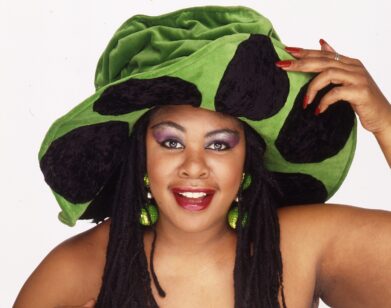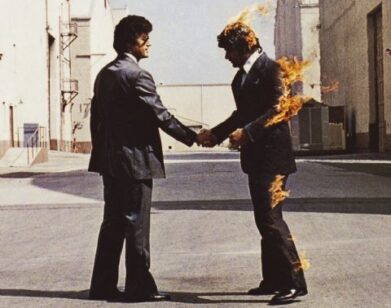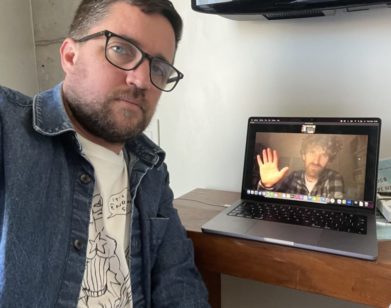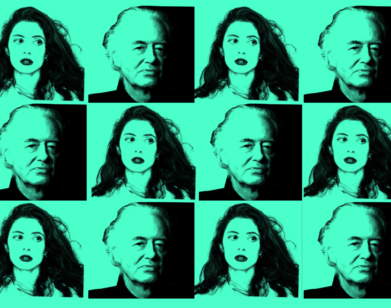ROCK AND ROLL
How the Director of Becoming Led Zeppelin Got the World’s Most Tight-Lipped Band to Talk

John Paul Jones, Robert Plant, John Bonham, and Jimmy Page at the Bath Festival of Blues June 28, 1969. Courtesy of Paradise Pictures and Sony Pictures Classics
When director Bernard MacMahon and producer Allison McGourty set out to make a documentary about Led Zeppelin’s early days, people called them crazy. The band had spent decades dodging interviews and turning down film requests. Nevertheless, the two spent months piecing together rare archival footage and interviews to pitch the film to the band’s surviving members, Robert Plant, Jimmy Page and John Paul Jones. To everyone’s surprise, they enthusiastically signed on. Since its February 5th release, Becoming Led Zeppelin has emerged as a box office sensation; without much press, it’s become the highest-growing IMAX music film of all time. It gained traction much like Zeppelin always did—by word of mouth. Last week, MacMahon and McGourty joined me in New York to talk about meeting the band, the political climate in the 1960s, and why women are essential to the story of Led Zeppelin.
———
ALLISON MCGOURTY: Hi, Clara.
BERNARD MACMAHON: Hello.
CLARA SCHOLL: Hello. So nice to meet you both.
MCGOURTY: It’s an honor to speak with Interview Magazine.
MACMAHON: I’ve read it for many years. I looked at it at Tower Records in Piccadilly Circus.
SCHOLL: It’s an honor to speak with you both. Congratulations on such a wonderful film.
MCGOURTY: Are you in New York?
SCHOLL: Yes, I’m in New York. Where are you two?
MCGOURTY: We’re in New York for a couple of days.
MACMAHON: But we live in Santa Monica.
SCHOLL: Very nice. If I wasn’t living in New York, I’d like to live in California.
MACMAHON: Definitely.
SCHOLL: Tell me, what drew you both to the subject of Led Zeppelin? What are your earliest memories of the band?
MACMAHON: We’ve made a series of films called American Epic about the first blues, gospel, country, Cajun music made in the twenties. Allison had had the idea of doing the film. She’d introduced me to Geoff Wonfor who did The Beatles anthology series in the nineties.
MCGOURTY: And Robert Redford came on board as an executive producer and narrator of that series.
MACMAHON: We’d done 10 years of work with all unseen footage, accumulating in six-and-a-half hours on how American music started. We were looking to do a follow-up film and I said to Allison, “When I was 12, I read this little paperback book about Led Zeppelin, and I was really inspired by this story.” It was about the early period of the group and how these four guys from different parts of Britain came together. They’re struggling to find their way in the music world, but they’re working incredibly hard. Two from the Midlands who can’t get into the snobby London music scene and two in the London scene that are session musicians and on massive records. They get together and recognize there’s something special because of all the stuff they’ve individually done. Jimmy Page says, “We’re going to not do anything that the music industry tells us to do. We’re not going to do any singles, we’re not going to do TV, we’re not going to do interviews. We’re going to pay for the album ourselves and then we’re going to own the album.”
MCGOURTY: So no one can interfere.
MACMAHON: They’re putting these albums out, their name isn’t even written on the album cover. There’s no pictures of them—it’s just the music.
SCHOLL: Wow.
MACMAHON: No other major act has done that before or since. This was a very inspiring message to me as a kid. I started listening to their music and fell in love with it. Plus, I had a personal connection. When I was seven, an antique dealer would come to our semi-detached house. He’d pat me on the head and ask how I was doing in school, buttering me up to try and get my mom to sell him pieces off the fireplace in our hallway, and she wouldn’t sell it to him. When my dad came home from work early, he saw this guy had parked his car out of view, so my mom couldn’t see it. It was a Rolls-Royce Silver Shadow. When he came the next week my mom said to him, “What is it you do apart from collecting antiques?” He went, “I manage Led Zeppelin.” It was Peter Grant.
SCHOLL: Wow.
MACMAHON: That was Uncle Peter to me. He wasn’t my real uncle, but that’s what I knew him as. I had this connection to the story. We started preparing the film like we did with the American Epic. We spent months researching.
MCGOURTY: Looking for any fragments of archive that existed.
MACMAHON: We tracked down an interview with John Bonham that could be found.
MCGOURTY: We scripted the screenplay and then we storyboarded it.

John Paul Jones, Robert Plant, John Bonham, and Jimmy Pageat The Royal Albert Hall during their U.K Tour performing “What Is And What Should Never Be” on January 18, 1970. Image: Paul Popper via Getty Images. Courtesy of Paradise Pictures and Sony Pictures Classics.
MACMAHON: The people we mentioned this to said, “You’re absolutely insane. They’ll never agree to do it.” But we went, “We don’t care. We think it’s a great story.” Everyone told us we wouldn’t be able to make American Epic either. We started putting the film together and then we reached out to the group, who turned out to be massive fans of American Epic. The message to the readers is, if you work hard, fortune will smile. What we are doing, you could do it too.
MCGOURTY: John Paul Jones actually made a pilgrimage to the scene of the very first episode, the Carter family in Maces Springs. He met the exact people that we’d interviewed in the film, so he felt a personal connection with us.
MACMAHON: Pretty much no one from the UK has been there. It’s a remote place. When we presented the film, we went through a five-hour meeting with John Paul Jones, Robert Plant and Pat Bonham, and seven hours with Jimmy Page. At one point, I said to Jimmy Page, “This is the point where you go and see Robert Plant singing for the first time.”
MCGOURTY: He was like, “What was the name of the group that Robert was singing with when we first met?”
MACMAHON: I’m like, “Obs-Tweedle.”
MCGOURTY: He said, “Very good, carry on.”
BERNARD MCMAHON: At the end of the pitch, they go, “We’re into it, what’s the rules of the road?” And we just said, “It’s got to be an independent movie.” They agreed to it.
MCGOURTY: They’re not producers—we had total artistic control and cut. The only thing they did was they brought suggestions and extra photographs and music that had never been heard before.
MACMAHON: When they turned up for the interviews, you could tell they were ready to tell their story enthusiastically. They’re very unself-conscious. I’ve never seen any musicians talk like that in a film before. It’s very intimate. All we did to enhance that was turning up with surprise footage that they’ve not seen in 60 years. They’re really in the moment as they go through their childhood and they’re constantly getting emotional looking at these things. The film is made for movie theaters and the biggest screens possible with the biggest sound systems. The whole film is constructed for that. All the film footage is the original negative or the original tape. The sound you are hearing is the purest sound of Zeppelin as possible to get from 1969. Most movies now, they’re compressed. We included the raw sound as it was intended to be heard in ’69 with no compression.
SCHOLL: That’s amazing. I was definitely struck by their transformation from schoolboys in uniforms to long-haired rock stars in velvet trousers. It also seems to mirror a wider cultural shift during the sixties and seventies. Do you think that this was unique to Led Zeppelin? Was it a part of a broader movement?
MACMAHON: This is quite a nuanced question. The film is showing you the historical context of the time for a number of reasons. Now, there are all these entities that are trying to make you not know what’s happening in the world. Then, most people would watch the 6:00 news. There was a general awareness of what was going on. In the late sixties, there was this massive crackdown and violence by governments on the youth movement that’s been building. That is informing Led Zeppelin’s music. Along with the beauty, there’s an aggression in their sound with the searing guitars and machine gun sounds. That’s representative of this aggression that’s coming in from the powers that be on these innocent kids.

John Bonham and Pat Phillips on their wedding day 1966. Courtesy of Paradise Pictures and Sony Pictures Classics.
SCHOLL: The sound of the film was truly incredible. I’m interested in one of the final performances of the film, which is a psychedelic montage overlaid with fragmented images, colors and sounds. Why did you choose this over a more straightforward approach?
MACMAHON: In this film, we were interested in early cinema, even silent cinema and the great musicals of MGM of the thirties and forties.
MCGOURTY: Abel Gance’s 1927 Napoleon was a big influence, wasn’t it?
MACMAHON: Yeah.
MCGOURTY: Similar to Frank Capra style films, we add lots of montage work. The newspapers dropping, the tickets dropping, everything you see on the screen is driving the story forward.
MACMAHON: The reason there’s that sequence at the end is that all the great musicals have a Fantasia sequence. The penultimate track of Singin’ in the Rain is this Fantasia that goes psychedelic. It’s rubric. It’s a part of a musical. So we are delivering that to you. All those images are telling you things. When a newspaper drops with a headline, there’ll be great significance to what is written.
MCGOURTY: It’s wonderful for me to see footage of what it was like in those early days. I wish I could have been there.
MACMAHON: Allison pointed out, which is true, that women drive the arts.
MCGOURTY: Women drive the culture.
MACMAHON: It’s women that launch the things that are meaningful because they are more instinctual about things they’re interested in. Blokes are much more self-conscious. They’re talking with each other going, “Is this cool? What do you think?”
SCHOLL: Absolutely.
MACMAHON: It’s important that the majority of the audience was female for Zeppelin.
MCGOURTY: It’s very gratifying.
MACMAHON: I remember John Paul Jones getting very wistful, almost tearing up, remembering these amazing women dancing at the shows. He said that in the early shows there were really cool women at the Fillmore West that went to all the concerts. He said it made him sad that as Zeppelin went on, it became these blokes. It was all much more regimented, he said. He’d be playing his bass and suddenly these women would be dancing and he’d be like, “This is so cool.” This feeling of connecting with these girls through music. This is why the film has an important message now. We had people back in the late sixties trying to control society.
MCGOURTY: Trying to divide us.
SCHOLL: Somewhat similar to now.
MCGOURTY: Very well-said.
MACMAHON: Maybe because you get people from all stripes that like Led Zeppelin. It’s not a political thing. Go to the cinema with your friends and watch it. It brings people together.
MCGOURTY: And we need that.
MACMAHON: They’re not having to connect on a chat room that’s controlled by some bloke in Silicon Valley. They’re meeting people face-to-face in the theater lobby, talking about what they’ve seen.
SCHOLL: I’m also interested to know if there were any misconceptions about Led Zeppelin that you wanted to address through the film. It doesn’t delve into their reputation for partying, drugs and sex.
MACMAHON: In the film, Robert Plant says that those forces are circling, but this is prior to those stories, which have lots of inaccuracies. Creating the film, I did 175 background research interviews with all people that knew them to corroborate what the story was.
MCGOURTY: That was a wonderful thing that the group did to help us—opening up their address books.
MACMAHON: They let us talk to people unsupervised and then knew that those people would introduce us to other people. I was meeting people that they hadn’t seen in years. We were allowed to do all the research we wanted, and that’s what’s on the screen.
SCHOLL: That’s amazing. What was the most surprising thing you discovered about the band members while you were making the film?
MACMAHON: How different they all are from each other, and how none of the preconceptions about Led Zeppelin were fundamental to why this group was successful. All four were serious about wanting to make music, and each had broad tastes. Combined, they were more than the sum of their parts.
MCGOURTY: They had so many different influences. As John Paul Jones says, “Led Zeppelin was the area in between them all.”
MACMAHON: When we were in the Bay Area we screened it for the heads of the counterculture in the West Coast.
MCGOURTY: Bob Weir, Peter Coyote and Taj Mahal.
MACMAHON: They’re watching the film, and Weir turns to me and goes, “This is game-changing.” He said, “Every kid should watch this film and it would tell them what their grandparents were really doing.”
SCHOLL: Wow.
MCGOURTY: Their concerts were different every night because there was so much improvising. That’s why the band couldn’t continue after John Bonham went, because nobody could fill in.
MACMAHON: Also, there’s a big thanks to [Andy] Warhol for this film. There’s a photograph of Jimmy Page when he’s in The Yardbirds meeting Andy Warhol. I called the head of the Warhol archive and said, “Do you have a screen test of Jimmy Page?” And as luck would have it, the guy running the Warhol archive, named Greg Pierce, was a massive Zeppelin fan. He said, “I don’t recall this, but believe me, I am going to search.” He searched the archive and said, “No, we don’t have that.” We tracked down a thousand unseen negatives of Zeppelin from 1969 from this amazing photographer called Ron Raffaelli. We scanned this whole reel of stills of each band member and meticulously restored the scratches. That’s why in the film, you see Robert Plant staring right into the camera, looking at you. That is thanks to the possibility that there might have been an Andy Warhol portrait.
SCHOLL: Amazing.
MCGOURTY: In fact, there’s going to be an exhibition of some of Ron Raffaelli’s work at the Morrison Hotel Gallery in Soho. If anybody wants to see those photographs, they can see them there.
SCHOLL: Thank you both so much for meeting with me. Now I want to watch it again.
MACMAHON: Go watch it in the biggest cinema you can and tell your readers to do the same. It’s what it’s made for.
MCGOURTY: The amazing thing is, I know you have readers everywhere, and this film is playing in every state in America, including Puerto Rico.
MACMAHON: It’s playing in over 1,000 cinemas, which is unheard of for a music film.
MCGOURTY: It’s connecting with people.
MACMAHON: We only started doing publicity in the last three days. We didn’t do any publicity before the film came out. It’s all word of mouth.
SCHOLL: Just like Zeppelin.
MCGOURTY: Yeah, exactly. That’s the Led Zeppelin way.





